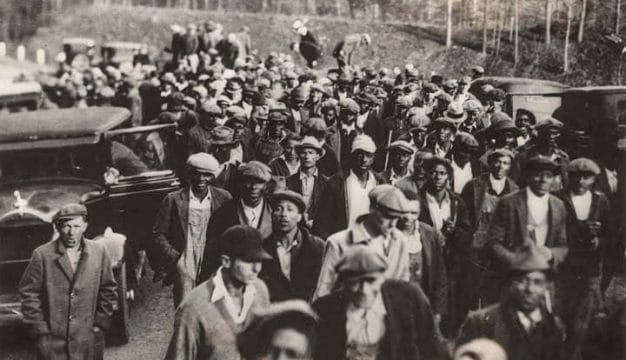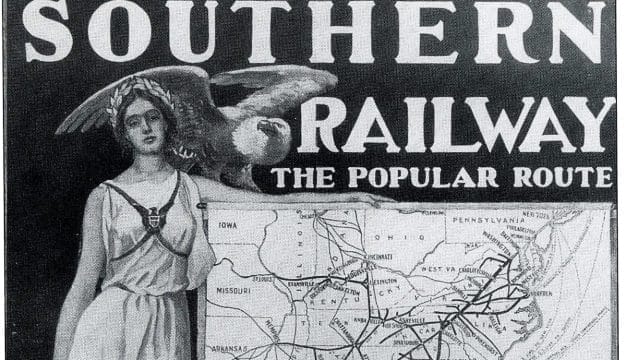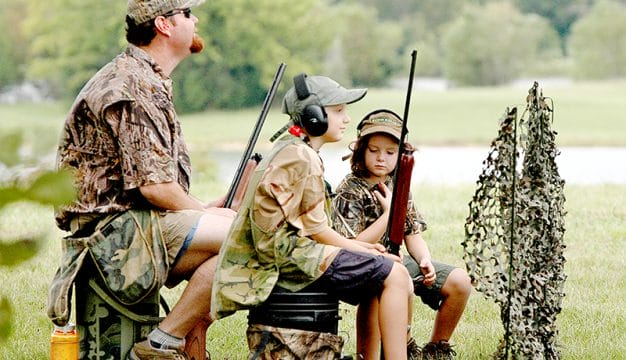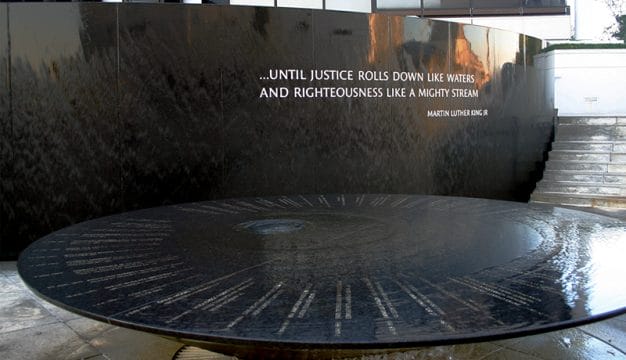Ralph "Shug" Jordan
Ralph “Shug” Jordan (1910-1980) coached the Auburn University football team from 1951 until his retirement at the end of the 1975 season. Recording 176 wins, 83 losses, and six ties, Jordan led his alma mater to more wins than any other head football coach in Auburn’s rich football history. Additionally, his 1957 team, which had a 10-0 record, was awarded the Associated Press’s national championship. His teams finished in the Associated Press Top Twenty 13 times, seven times in the Top Ten, and four times in the Top Five.
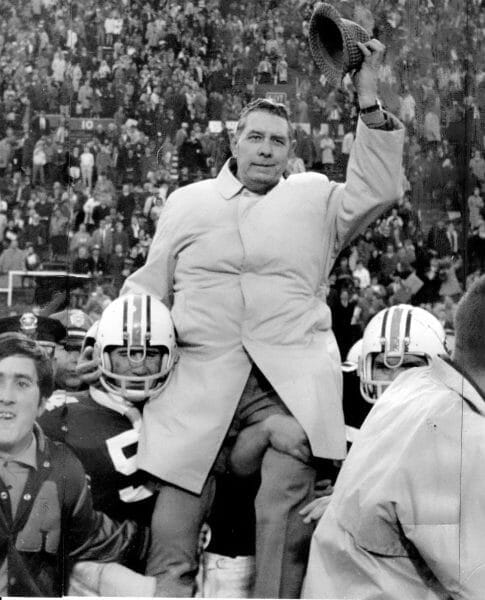 Ralph “Shug” Jordan
James Ralph Jordan (pronounced Jurdan) was born in Selma, in Dallas County, on September 25, 1910, to James Harry Jordan, a railroad worker, and Katherine Agnes Darby. The family lived briefly during Jordan’s elementary school years near Grove Hill in Clarke County, but they returned to Selma, and Jordan graduated from A. G. Parrish High School, lettering in several sports, including football. Jordan’s boyhood friends in Selma gave him the nickname “Shug” (spelled “Sug” early on) because of his fondness for chewing on sugar cane. He was also known as Lefty throughout high school and college because he was left-handed. Jordan entered Alabama Polytechnic Institute (now Auburn University) in 1928 and soon became highly recognized on campus. He lettered in football, basketball, and baseball in his sophomore, junior, and senior years and was voted by teammates as Auburn’s Most Outstanding Athlete in 1932. Jordan was especially gifted at basketball and was a center on the football team and a pitcher on the baseball team. He was a member of the Theta Chi fraternity, served as treasurer of the senior class, and became a member of Spade, a highly selective society on campus. In 1932, Jordan graduated from Auburn with a degree in education and a reserve commission in the U.S. Army.
Ralph “Shug” Jordan
James Ralph Jordan (pronounced Jurdan) was born in Selma, in Dallas County, on September 25, 1910, to James Harry Jordan, a railroad worker, and Katherine Agnes Darby. The family lived briefly during Jordan’s elementary school years near Grove Hill in Clarke County, but they returned to Selma, and Jordan graduated from A. G. Parrish High School, lettering in several sports, including football. Jordan’s boyhood friends in Selma gave him the nickname “Shug” (spelled “Sug” early on) because of his fondness for chewing on sugar cane. He was also known as Lefty throughout high school and college because he was left-handed. Jordan entered Alabama Polytechnic Institute (now Auburn University) in 1928 and soon became highly recognized on campus. He lettered in football, basketball, and baseball in his sophomore, junior, and senior years and was voted by teammates as Auburn’s Most Outstanding Athlete in 1932. Jordan was especially gifted at basketball and was a center on the football team and a pitcher on the baseball team. He was a member of the Theta Chi fraternity, served as treasurer of the senior class, and became a member of Spade, a highly selective society on campus. In 1932, Jordan graduated from Auburn with a degree in education and a reserve commission in the U.S. Army.
In 1932, Auburn head football coach Chet Wynne, who played for the legendary Knute Rockne, hired Jordan to coach the freshman football team and serve as an assistant coach on the varsity football team. In addition, Jordan coached the men’s basketball team and in a 10-year run compiled a very respectable 88-66 record. In 1934, while on a basketball trip, Jordan met Evelyn Walker, a student at the University of South Carolina. The couple married on June 11, 1937, and would have three children.
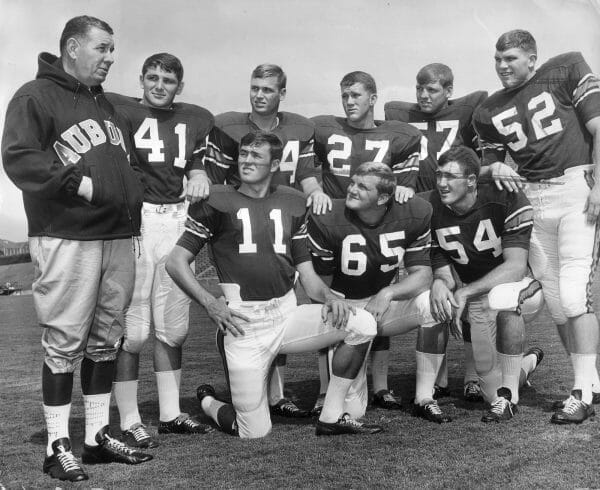 Ralph “Shug” Jordan and Tigers
Upon entry of the United States into World War II, Jordan reactivated his military commission as a lieutenant in the Army Corps of Engineers. He was assigned to the First Engineer Special Brigade, an amphibious assault force that participated in the invasions of North Africa, Sicily, Italy, and France. Jordan received the Purple Heart for a shrapnel wound to his left arm sustained during the June 6 invasion of Normandy at Utah Beach and later participated in the Okinawa campaign in the Pacific in 1945. He also received the Bronze Star. Jordan had achieved the rank of major when he resigned his commission. In pre-game talks to his football teams, Jordan frequently drew analogies between the great battles of World War II and the battle on the gridiron.
Ralph “Shug” Jordan and Tigers
Upon entry of the United States into World War II, Jordan reactivated his military commission as a lieutenant in the Army Corps of Engineers. He was assigned to the First Engineer Special Brigade, an amphibious assault force that participated in the invasions of North Africa, Sicily, Italy, and France. Jordan received the Purple Heart for a shrapnel wound to his left arm sustained during the June 6 invasion of Normandy at Utah Beach and later participated in the Okinawa campaign in the Pacific in 1945. He also received the Bronze Star. Jordan had achieved the rank of major when he resigned his commission. In pre-game talks to his football teams, Jordan frequently drew analogies between the great battles of World War II and the battle on the gridiron.
Jordan returned to Auburn and coached the basketball team in 1945, but when the head football coach at the time expressed displeasure over some of the returning war veterans and coaches, such as Jordan, being allowed (by law) to rejoin the football staff, Jordan resigned. He briefly served as an assistant coach in the All-America Football Conference, a rival of the National Football League, for the Miami Seahawks before joining the coaching staff at the University of Georgia during the 1946 season. Jordan remained at Georgia under head coach Wally Butts until he was enticed to return to Auburn in 1951 as head football coach by a college friend, Jeff Beard, who was the school’s athletic director. Jordan inherited a program that was demoralized by a winless season the previous year and put together a young and enthusiastic coaching staff, including players he had coached at Georgia. Jordan’s first pre-season camp was notoriously tough, but it paid off. The 1951 team, which included Vince Dooley, won five games and lost five games.
Jordan and Auburn built on the momentum he established that first season, winning the national championship in 1957, as well as the Southeastern Conference football title. Auburn was ineligible for post-season play that year, however, because it had been placed on probation by the NCAA for recruiting violations and did not play a bowl game. Jordan’s 1958 team earned nine wins and one tie. Quarterback Lloyd Nix led the team in both years to a 24-game unbeaten streak that ended with the 1959 season opener against Tennessee.
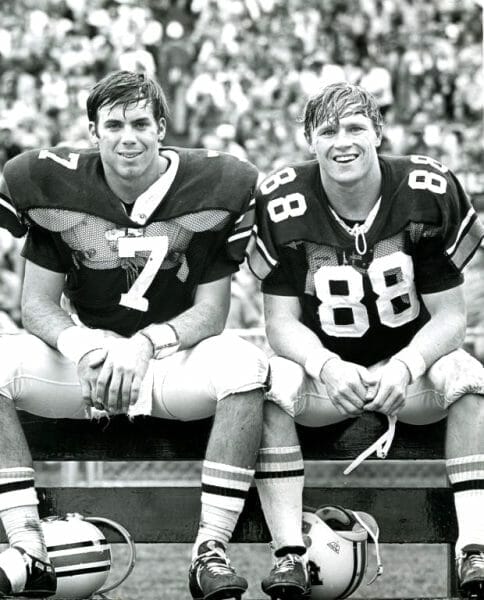 Pat Sullivan and Terry Beasley
Many people consider the 1950s to be Jordan’s best decade as head football coach at Auburn, but during the course of his career many of his other teams finished high in the national rankings. Jordan’s most honored player was quarterback Pat Sullivan, who won the Heisman Trophy in 1971 as the nation’s best college football player. Jordan also coached numerous All-Americans, among them Sullivan, Terry Beasley, Jimmy Phillips, Zeke Smith, Ed Dyas, Ken Rice, Tucker Frederickson, Jackie Burkette, Jimmy Sidle, and Buddy McClinton. Jordan noted that his 1972 team was one of his favorites. A major underdog entering the season, “The Amazins,” as they were known, finished with a 10-1 record, including a famous 17-16 win over their undefeated rival, the University of Alabama, coached by Paul “Bear” Bryant. In that comeback win, trailing 16-3 in the fourth quarter, Auburn’s Bill Newton blocked two punts and David Langner picked up both loose balls and ran in for touchdowns on mirror-image plays.
Pat Sullivan and Terry Beasley
Many people consider the 1950s to be Jordan’s best decade as head football coach at Auburn, but during the course of his career many of his other teams finished high in the national rankings. Jordan’s most honored player was quarterback Pat Sullivan, who won the Heisman Trophy in 1971 as the nation’s best college football player. Jordan also coached numerous All-Americans, among them Sullivan, Terry Beasley, Jimmy Phillips, Zeke Smith, Ed Dyas, Ken Rice, Tucker Frederickson, Jackie Burkette, Jimmy Sidle, and Buddy McClinton. Jordan noted that his 1972 team was one of his favorites. A major underdog entering the season, “The Amazins,” as they were known, finished with a 10-1 record, including a famous 17-16 win over their undefeated rival, the University of Alabama, coached by Paul “Bear” Bryant. In that comeback win, trailing 16-3 in the fourth quarter, Auburn’s Bill Newton blocked two punts and David Langner picked up both loose balls and ran in for touchdowns on mirror-image plays.
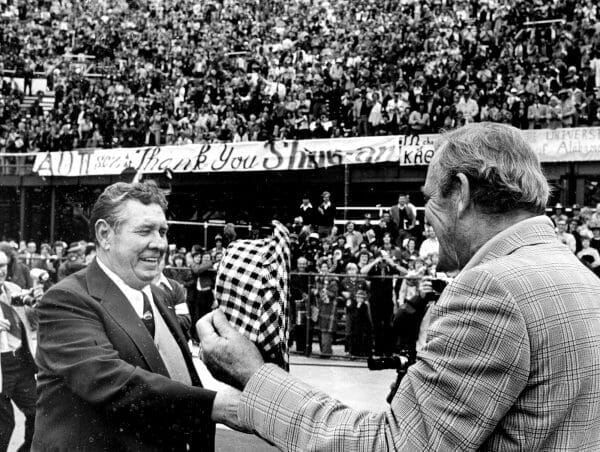 Shug Jordan and Bear Bryant, 1975
In 1973, Jordan became the first active coach in America to have a stadium named after him. Preceding the game with the University of Mississippi on October 6, in a ceremony attended by Gov. George Wallace, the university renamed Cliff Hare Stadium as Jordan-Hare Stadium. His 1974 team finished with a 9-2 record and was ranked eighth in the nation. In fact, three of his final six teams finished in the Top Ten, exemplifying Jordan’s ability to adapt to the changing, modern ways of college football even in the twilight of his career.
Shug Jordan and Bear Bryant, 1975
In 1973, Jordan became the first active coach in America to have a stadium named after him. Preceding the game with the University of Mississippi on October 6, in a ceremony attended by Gov. George Wallace, the university renamed Cliff Hare Stadium as Jordan-Hare Stadium. His 1974 team finished with a 9-2 record and was ranked eighth in the nation. In fact, three of his final six teams finished in the Top Ten, exemplifying Jordan’s ability to adapt to the changing, modern ways of college football even in the twilight of his career.
Having served Auburn as head football coach for 25 years, Jordan voluntarily retired in 1975. Under his leadership, the Auburn Tigers appeared in 12 bowl games, including the Orange and Sugar bowls. He was named National Coach of the Year in 1957 and voted Southeastern Conference Coach of the Year in 1953, 1957, 1963 and 1972. In 1969, Jordan was inducted into the first class of the Alabama Sports Hall of Fame. In retirement, Jordan served on the Auburn University Board of Trustees and was instrumental in seeing through the plan that expanded seating capacity in the stadium that bore his name to more than 72,000.
In April 1980, Jordan was diagnosed with acute leukemia. He died at his Auburn home on July 17. Six of his former players served as pallbearers at his funeral, and he was buried in Memorial Park Cemetery in Auburn. Jordan was inducted into the National Football Foundation Hall of Fame posthumously in 1982.
Jordan remains one of the most highly respected personalities in the history of Auburn University, not only because of his success as head football coach, but also because of his tireless devotion to the university and the community. His gentlemanly demeanor in his public and private life endeared him to the Auburn faithful.
Further Reading
- Bolton, Clyde. War Eagle, The Story of Auburn Football. Tomball, Tex.: Strode Publishers, 1973.
- Donnell, Rich. Shug: The Life and Times of Auburn’s Ralph ‘Shug’ Jordan. Montgomery, Ala.: Owl Bay Publishers, 1993.
- Housel, David. From the Desk of David Housel . . . : A Collection of Auburn Stories. Auburn: Auburn Network, 1991.
- Reeder, Paul. The Auburn Tigers of 1957: National Champions. Montgomery, Ala.: Brown Printing Company, 1990.
- Shug Jordan Diary of 1975 Season. Auburn University Libraries, Special Collections & Archives, Auburn, Alabama.
